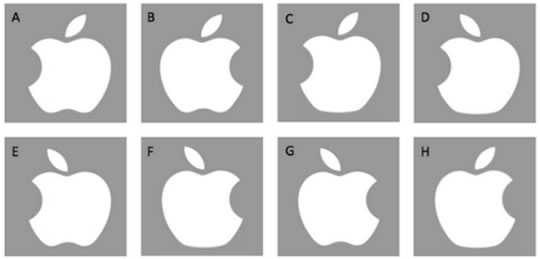Which of the images above is the Apple logo?
If you selected “B” then you did better than 84 out of 85 UCLA students who were asked the same question.
All 84 got it wrong.
And this was in a group in which 52 were exclusively Apple users, while fully 75 owned Apple products.
They were presumably seeing the logo multiple times each day: on their computer, iPads and iPhones.
And yet they couldn’t pick it out of this line-up.
This was despite being very confident beforehand that they would be able to draw it from memory.
Dr Alan Castel, one of the study’s authors, said:
“There was a striking discrepancy between participants’ confidence prior to drawing the logo and how well they performed on the task.
People’s memory, even for extremely common objects, is much poorer than they believe it to be.”
The reason for this discrepancy is that our minds focus on information that’s really important to us, although we don’t realise it.
The details of a corporate logo are not that important in our daily lives.
Our memories tend to store the ‘gist’ of information rather than the specifics.
You’d easily be able to tell the Apple logo from the Windows logo, but drawing both accurately would be a challenge.
The study’s authors write of the classic example that…
“…people often have difficulty recognizing the correct locations of features on a penny.
Although pennies are common objects, people may not have a functional reason for encoding the specific features of currency.
However, people often fail to recall the location of previously seen fire extinguishers, despite the fact that fire extinguishers are in high-visibility locations and are associated with high-risk situations.
Explicit memory is also poor for items that people interact with daily, such as the keypads of calculators, telephones, computer keyboards, the layout of frequently-used elevator buttons, and aspects of road signs.”
So if you feel your memory is poor, then take heart from this study — it just means the stuff you can’t remember isn’t that important to you.
The study is published in The Quarterly Journal of Experimental Psychology (Blake et al., 2015).
Image credit: Adam Blake, Meenely Nazarian, Alan Castel/UCLA Psychology

